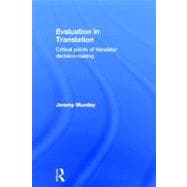
Note: Supplemental materials are not guaranteed with Rental or Used book purchases.
Purchase Benefits
What is included with this book?
| List of figures and tables | p. xi |
| Acknowledgements | p. xiii |
| Introduction | p. 1 |
| Evaluation and translation | p. 11 |
| Introduction | p. 11 |
| Ideology and axiology | p. 12 |
| Systemic functional linguistics and the value orientation of language | p. 13 |
| Ideology and axiology in translation | p. 16 |
| Appraisal theory and the concept of evaluation | p. 20 |
| The system of appraisal | p. 22 |
| Direct, or 'inscribed', attitude | p. 24 |
| Indirect, or invoked, attitude | p. 27 |
| Evoked attitude | p. 27 |
| Provoked attitude | p. 29 |
| Studies of attitude in translation | p. 31 |
| Graduation and engagement | p. 33 |
| Evaluation as an integrated complex | p. 34 |
| Evaluation, textual voice and evidentiality | p. 35 |
| Evaluation and reading positions | p. 37 |
| Evaluation and 'critical points' in translator and interpreter decision-making | p. 40 |
| The interpretation of political speech | p. 42 |
| Introduction | p. 42 |
| The broadcast context | p. 42 |
| The expression of appraisal | p. 44 |
| Affect | p. 45 |
| Judgement | p. 48 |
| Appreciation | p. 54 |
| Provoked evaluation - lexical metaphors | p. 57 |
| Indirect evaluation and the question of translation | p. 62 |
| Graduation | p. 65 |
| Counter-expectancy indicators | p. 66 |
| Engagement | p. 67 |
| Deictic positioning | p. 68 |
| Translation of pronouns | p. 73 |
| Spatio-temporal deixis and identity | p. 74 |
| Reading position and voice of the interpreter | p. 76 |
| Conclusion | p. 78 |
| Transcript of Obama inaugural speech, 20 January 2009 | p. 80 |
| The view from the technical translators | p. 84 |
| Introduction | p. 84 |
| The perception of the professionals | p. 84 |
| Text-type and explicitation | p. 89 |
| The Chinese context | p. 90 |
| KudoZ™ | p. 92 |
| SENSE | p. 97 |
| Conclusion | p. 102 |
| The literary translator and reviser | p. 104 |
| Introduction | p. 104 |
| Revisions of a classical text - Agricola and Germania | p. 105 |
| The manuscript revised | p. 106 |
| Evaluative keys and reading position | p. 109 |
| Revision between author, translator and reader - Mario Vargas Llosa | p. 110 |
| Correspondence and queries | p. 111 |
| Indirect, associative evaluation | p. 112 |
| The reader-author relationship | p. 113 |
| Lexical alternatives in the essay genre | p. 118 |
| The practice of self-revision - David Bellos' translation of Georges Perec | p. 121 |
| The detail of self-revision | p. 122 |
| Revision and evaluation at different stages | p. 128 |
| Conclusion | p. 129 |
| Translation variation and its link to attitude | p. 131 |
| Introduction | p. 131 |
| The texts: Borges and his translators | p. 132 |
| Analysis of the Yates and Hurley translations of 'Emma Zunz' | p. 134 |
| The experiment | p. 140 |
| Invariance | p. 140 |
| Linguistic variation in attitude and appraisal | p. 143 |
| Attitude-rich words | p. 146 |
| Genre differences | p. 148 |
| Conclusion | p. 152 |
| 'Emma Zunz' extracts translated by Yates and Hurley | p. 153 |
| Evaluation in translation - some concluding thoughts | p. 155 |
| The results of the case studies | p. 155 |
| Reading positions | p. 158 |
| For the future | p. 159 |
| Notes | p. 161 |
| Bibliography | p. 173 |
| Index | p. 185 |
| Table of Contents provided by Ingram. All Rights Reserved. |
The New copy of this book will include any supplemental materials advertised. Please check the title of the book to determine if it should include any access cards, study guides, lab manuals, CDs, etc.
The Used, Rental and eBook copies of this book are not guaranteed to include any supplemental materials. Typically, only the book itself is included. This is true even if the title states it includes any access cards, study guides, lab manuals, CDs, etc.